Brake Repair and Service
A vehicle’s stopping distance is affected by many factors. Of course, the condition and operation of the braking system are the biggest factor, but the condition of your tires and suspension, and the weight of the vehicle and its contents also affect how far it takes your vehicle to come to a stop. If your vehicle isn’t stopping as well as it should, bring it in for a free brake inspection. Our Master Technicians will inspect your vehicle to determine which components need replacement. Our expertise makes us the place to turn in Chicago for brake repair.
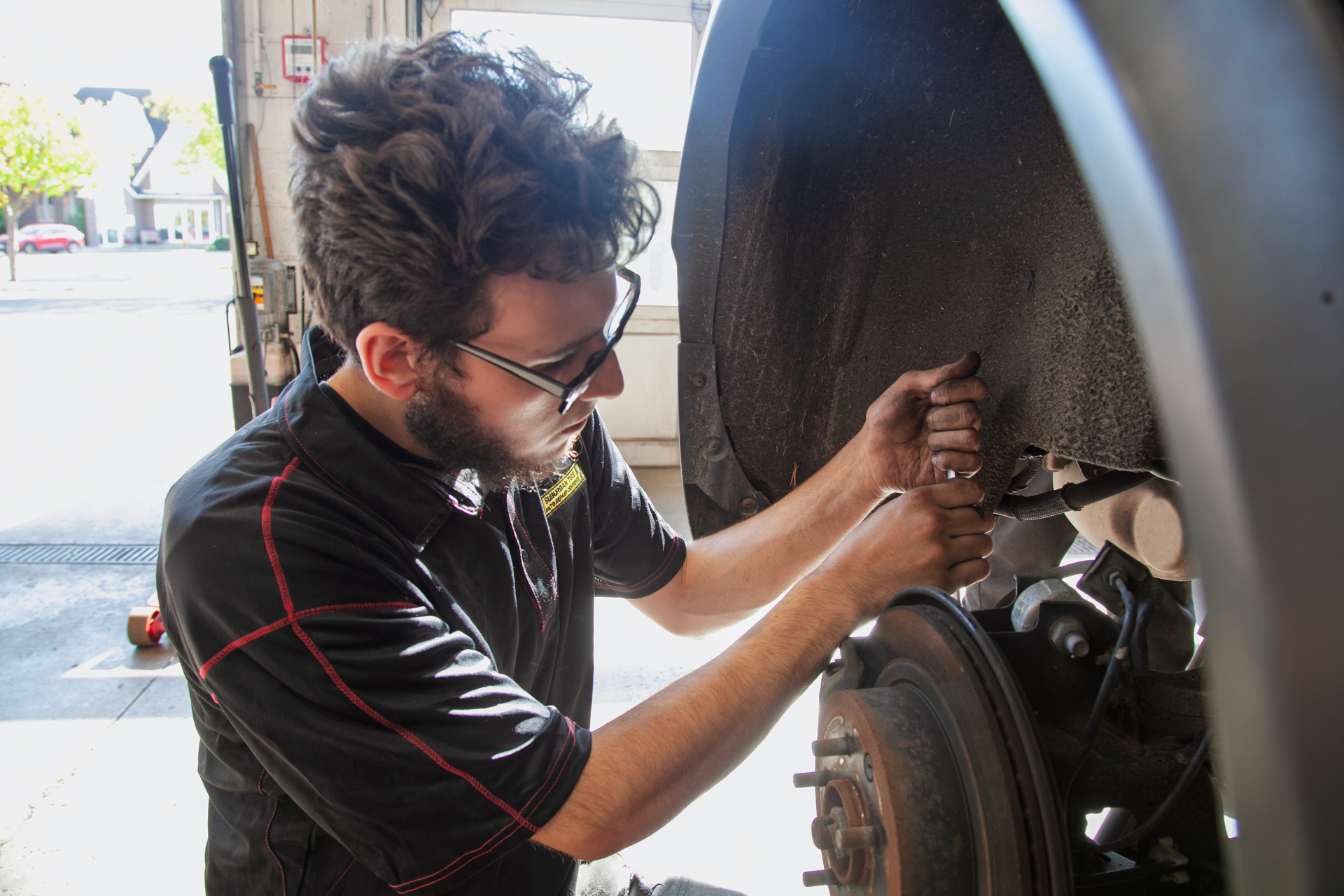
Common Symptoms of Failing Brakes
Not sure if your brakes are working right? At Suburban Tire Auto Repair Center, we offer a FREE visual brake inspection which includes measuring the brake pads or shoes and testing the brake fluid. During your brake system inspection at one of our auto shops, our certified technicians will let you know what brake service is recommended for you.
If your brakes need service or repairs, our expert technicians are equipped to perform any brake repair, including installing new brake pads and resurfacing or replacing the rotors. You should have your brakes inspected when any of the following occur:
- It’s been over a year or 12,000 miles since the last time your brakes were inspected
- It’s been 3 years or longer since your last brake job or brake fluid exchange
- Dashboard ABS or Brake lights or warnings
- Leaking brake fluid
- Changes in brake pedal response or feel
- Soft and spongy, or hard and stiff brakes pedal feel
- The brake pedal responds slowly or requires excess pressure
- Squealing, grinding, squeaking, or rattling noises when braking
- Shaking or vibrating when braking
- Vehicle pulls to the left or right when braking
- Vehicle takes a longer distance to come to a stop than normal
Visual Brake Inspection FREE
- Measure brake pads or shoes
- Test brake fluid for copper and other contaminants
Hands-On Brake Inspection
- Test drive vehicle for noises, brake pedal feel, and brake operation
- Measure brake pads or shoes
- Inspect hydraulic system for leaks
- Check operation of brake calipers
- Test brake fluid for copper and other contaminants
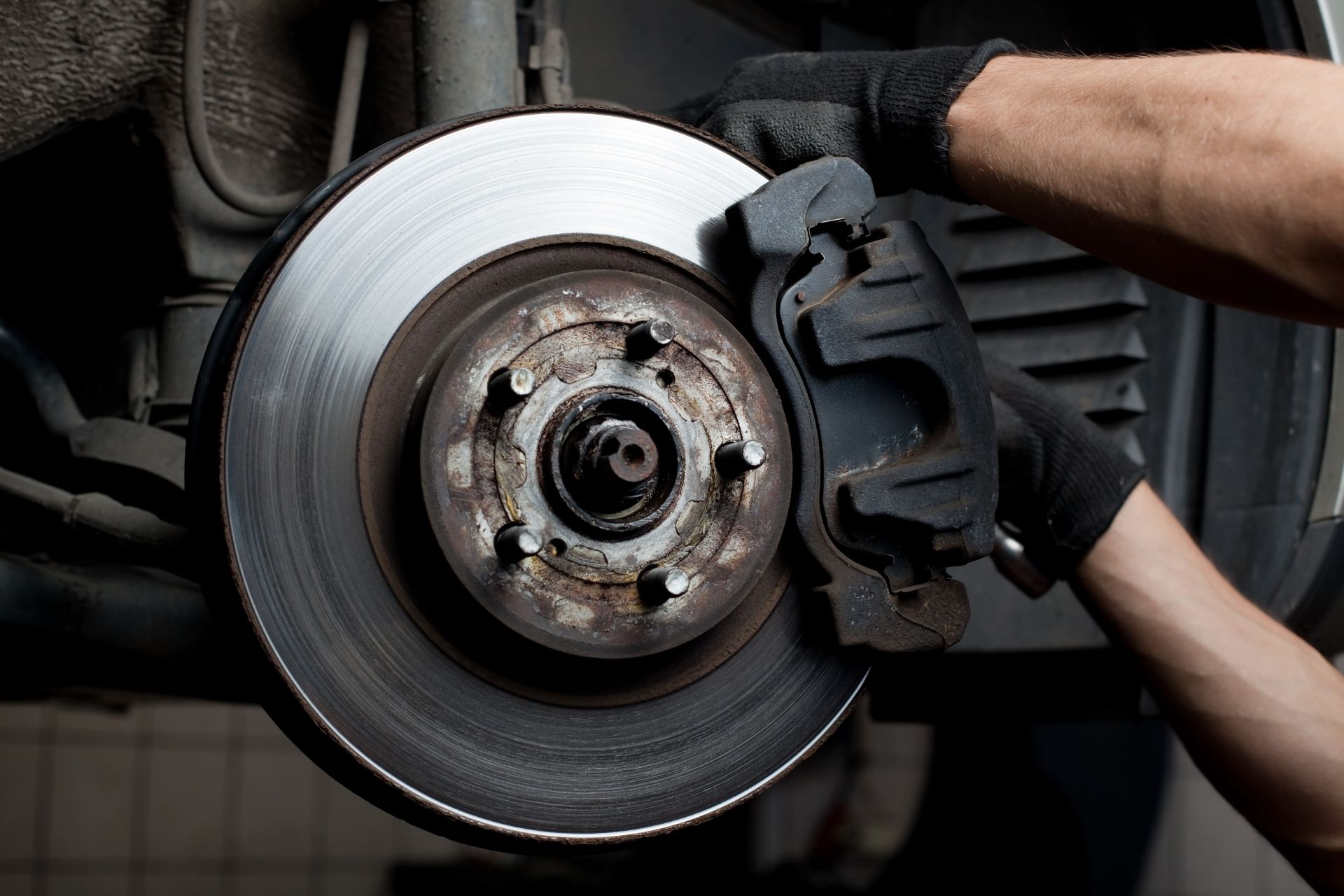
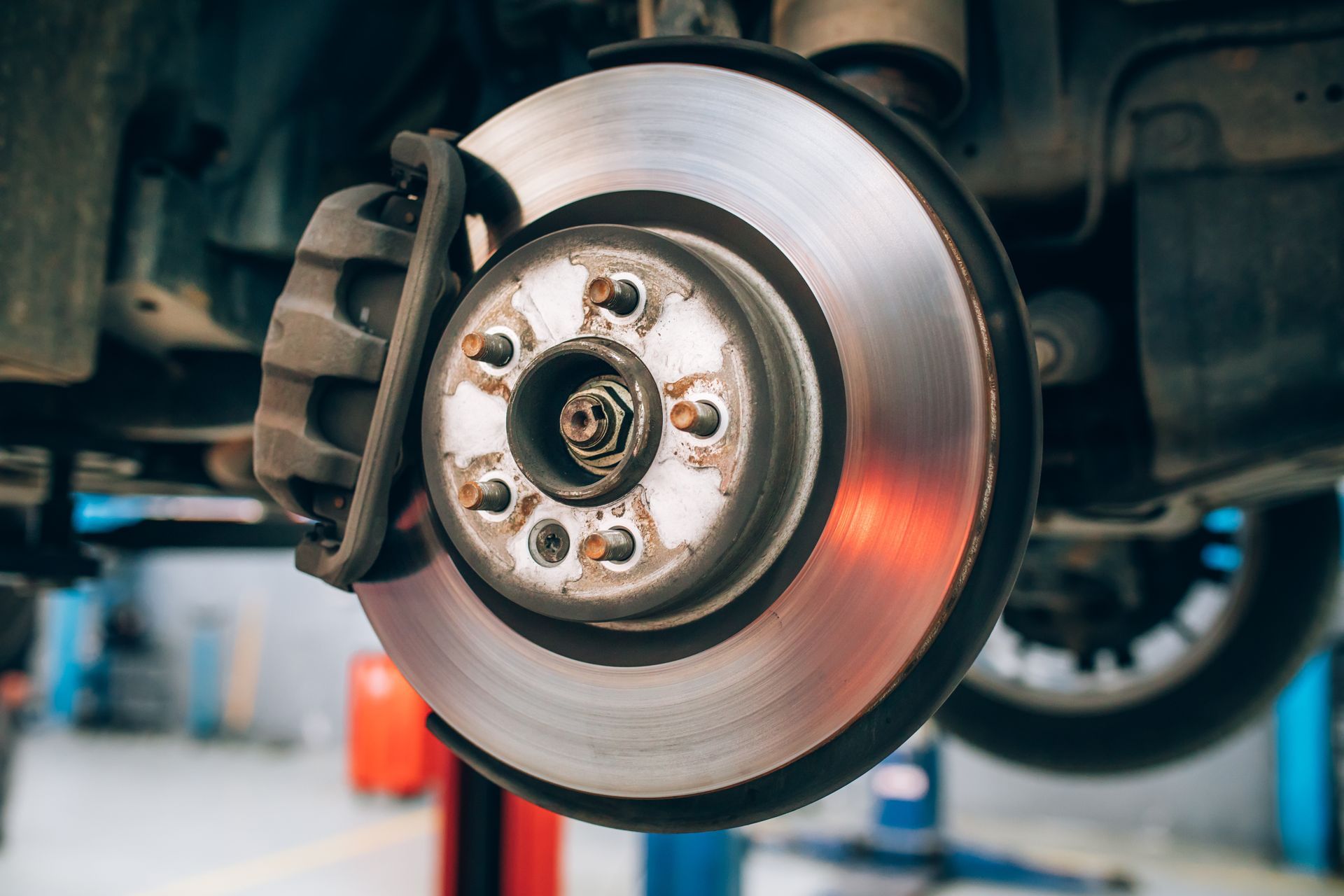
How Long Do Brakes Last?
Like anything else, the life span of your brake components depends on their initial quality, and on how well you take care of the components. The first brake job on a new vehicle is typically performed around 25,000 to 30,000 miles on the front axle, and at 45,000 to 60,000 miles on the rear axle. There is some variation based on the driving habits of the vehicle owner, and how the vehicle is loaded. Your mileage may vary. As a vehicle ages the mile interval between brake jobs tend to drop as parts such as the brake calipers or wheel cylinders wear out and don’t perform as they did when new. We recommend checking the brakes every 5,000 miles or whenever you get your tires rotated.
When we started in business in 1976, a standard car brake system repair job involved replacing the brake pads and using a brake lathe to machine a fresh surface onto the old brake rotors. This was back in the day when cars were big, and their rotors were fat and meaty. But as fuel economy standards became more stringent, car manufacturers downsized their brake rotors to improve fuel economy. Most of today’s vehicles have brake rotors that are designed to be as light as possible, so by the time your brake pads need replacement, the brake rotors have also worn below their minimum thickness specification. Thus, we typically replace the brake pads and the brake rotors at each brake job. Come into any of our local brake shops and we’ll provide the service you need.
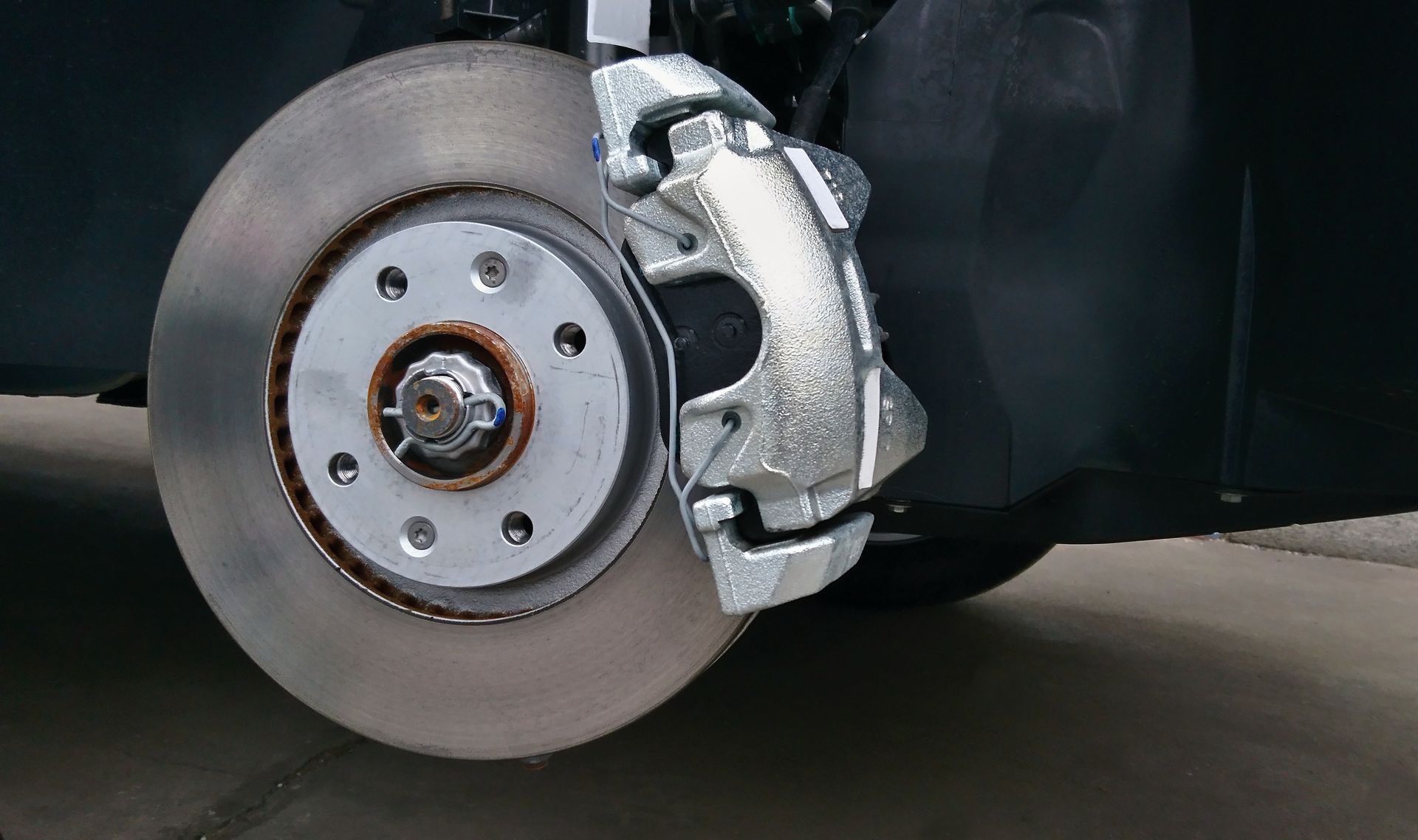
Our Brake Service Packages
Standard Brake Package
- Installation of standard brake pads or shoes
- Installation of standard brake rotors
- Clean and reuse existing brake hardware components
- Bleed and top off brake fluid from hydraulic system to remove air
- 1 Year, 12,000-mile warranty on parts and labor
Premium Brake Package
Recommended for most modern cars, SUVs, and light trucks
- Installation of premium brake pads
- Installation of painted brake rotors
- Installation of premium brake hardware kit and silencing shims
- Flush old brake fluid from hydraulic system and replace with new brake fluid
- 2 Years, 24,000-mile warranty on parts and labor
Luxury Brake Package
Recommended for luxury European vehicles, or for discerning clients who want the absolute best in safety and performance.
- Installation of Adaptive One® or Akebono® brake pads tuned specifically for your vehicle
- Installation of phosphorous coated brake rotors
- Installation of specialized vehicle specific brake hardware kit
- Flush old brake fluid from hydraulic system and replace with new brake fluid
- 3 Years, 36,000-mile warranty on parts and labor
- There may be additional charges for brake pad wear sensors and electronic parking brakes commonly found on some luxury vehicles. See options at checkout.
Complete Your Brake Service with New Brake Calipers
Brake calipers are the hydraulic parts that do the work of bringing your vehicle to a stop. When you step on the brake pedal, hydraulic fluid is forced into the caliper chamber, forcing the caliper piston to compress the brake pad against the rotor. The clamping friction of the pad contacting the rotor then brings the car to a stop. This video shows how this happens.
Maximize braking performance
We recommend replacing your brake calipers as part of doing a complete brake job. Over time, the square cut rubber seals on the caliper pistons harden and lose their elasticity, causing the seals to leak. Rust, corrosion, and brake dust on the caliper piston can also accelerate seal wear. When new brake pads are installed, the caliper pistons are pushed back into their bores causing the rough area of the piston to rub against the seal, damaging the seal. So even if the caliper seal is in good condition, when the linings are replaced it the seal will be damaged. The rust and corrosion on the caliper piston will also contaminate the brake fluid. That’s why our car brake specialists suggest replacing the calipers to maximize performance and restore the system to like-new condition.
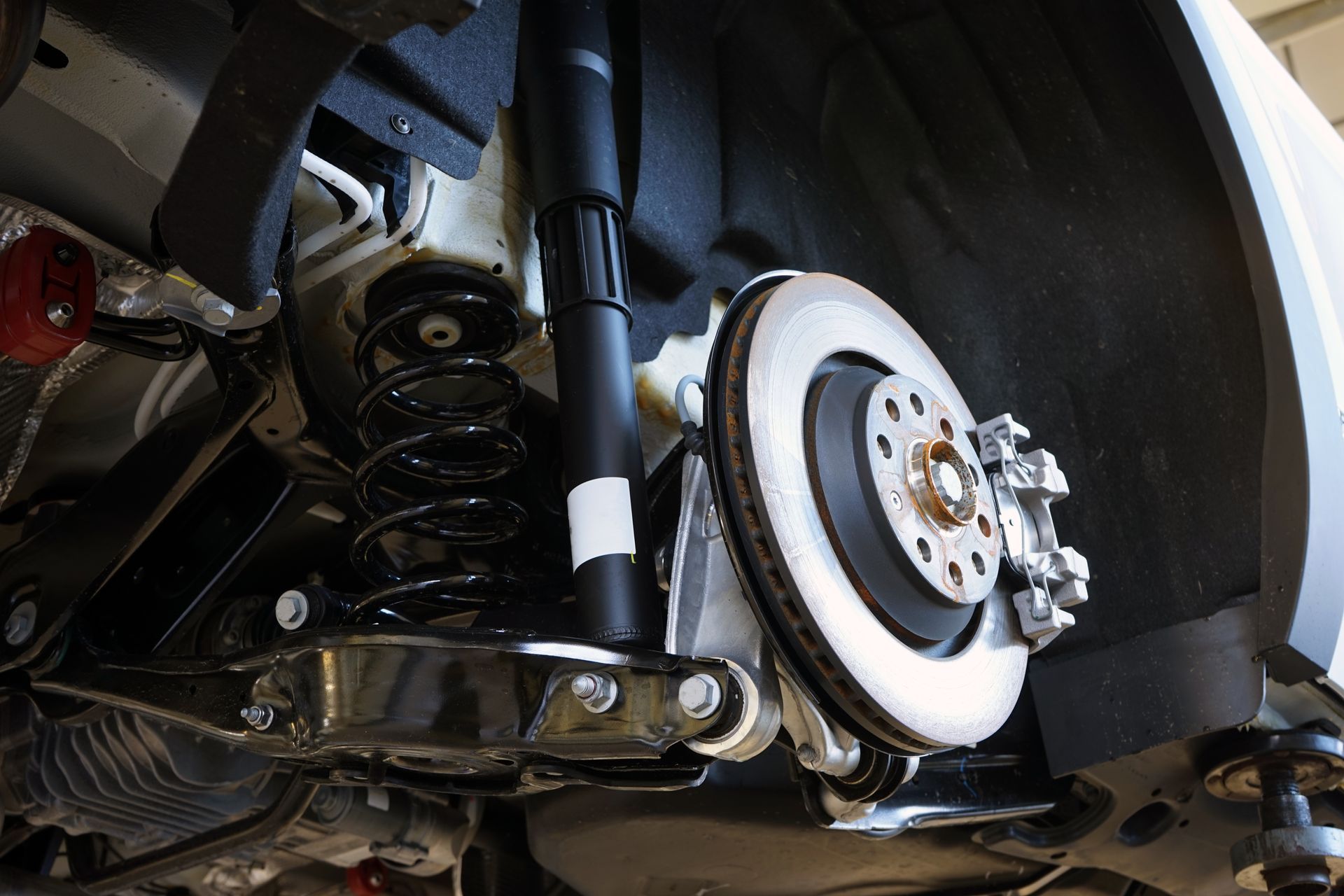
Add-on Caliper Package
Economy Caliper Package
Recommended for most older cars, SUVs, and light trucks
- Installation of two Proformer brake calipers or equivalent with our economy brake package
- Includes flushing the old brake fluid from hydraulic system and replacing with new brake fluid
Standard Caliper Package
Recommended for most everyday cars, SUVs, and light trucks
- Installation of two Total Eclipse brake calipers or equivalent with our standard brake package
- Includes flushing the old brake fluid from hydraulic system and replacing with new brake fluid
Premium Caliper Package
Recommended for premium and luxury cars, SUVs, and light trucks
- Installation of two Adaptive One® or Akebono® brake calipers with our premium or luxury brake packages
- Includes flushing the oil
